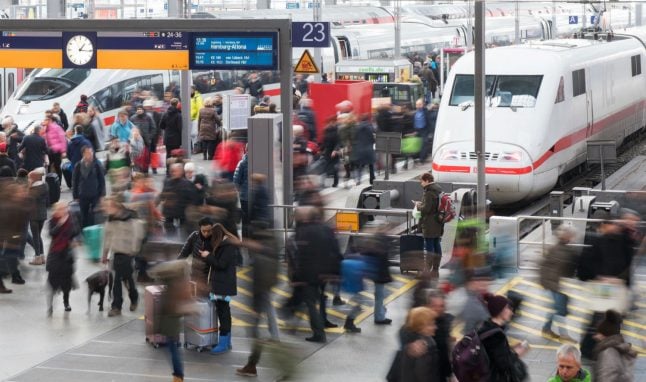More rail travellers than ever are asking for compensation due to late trains, reports DPA. Around 2.7 million passengers made a claim over delays in 2018 – 50 percent more than in 2017, according to new figures.
The average amount of compensation is also rising: it was just under €20 in 2018, compared to €19 the previous year.
Numerous railway companies are involved in the compensation system, not only Deutsche Bahn (DB). However, by far the largest part of the sum is linked to long-distance trains, which are almost exclusively run by the state-owned company.
SEE ALSO: How Deutsche Bahn plans to improve its service and staffing in 2019
SEE ALSO: Everything you need to know about travelling by train in Germany
The figures also go some way to dispel the myth that Germany is a punctual country: every fourth long-distance train was late in 2018.
DB blamed the delays on situations that were often out of their hands. They said storms, heavy rain, lightning strikes and the summer drought all slowed down train travel in the Bundesrepublik last year.
Furthermore, there was a track closure after a fire on an ICE long-distance train in October, plus a strike by railway workers in December that paralyzed the whole network.
Passengers' rights
Passengers can ask for compensation if they arrive at their destination an hour late. In this situation they can receive a quarter of their fare back by submitting an application. If there’s a two hour delay, passengers can receive half their fare back.
This has been the case since summer 2009 – and the number of applications for compensation has steadily increased since then. From July 2009 to June 2010, 800,000 passengers turned to the Passenger Rights Service Centre.
In future, customers may be able to get even more money back. As The Local has reported, the EU Parliament wants to ensure that for delays of one-and-a-half-hours, three-quarters of the ticket price would have to be refunded, and for delays of more than two hours, the whole price.
SEE ALSO: Train travellers in Germany should receive more money back for delays: Vote
If passengers miss a connecting train, they should also be entitled to a seat on the next train at no additional cost, according to EU politicians.
There’s also the issue of how passengers can claim cash back. For years, consumer protectors have been demanding that customers should be able to assert their rights online. Currently they must send a letter by post.
“The fact that parties have to print out the passenger rights form and send it by letter post is no longer up-to-date, but downright antiquated”, traffic expert Marion Jungbluth told German business publication Handelsblatt.
Jungbluth suspects that customers would demand their money back more frequently if the claim could be done online.


 Please whitelist us to continue reading.
Please whitelist us to continue reading.
Member comments